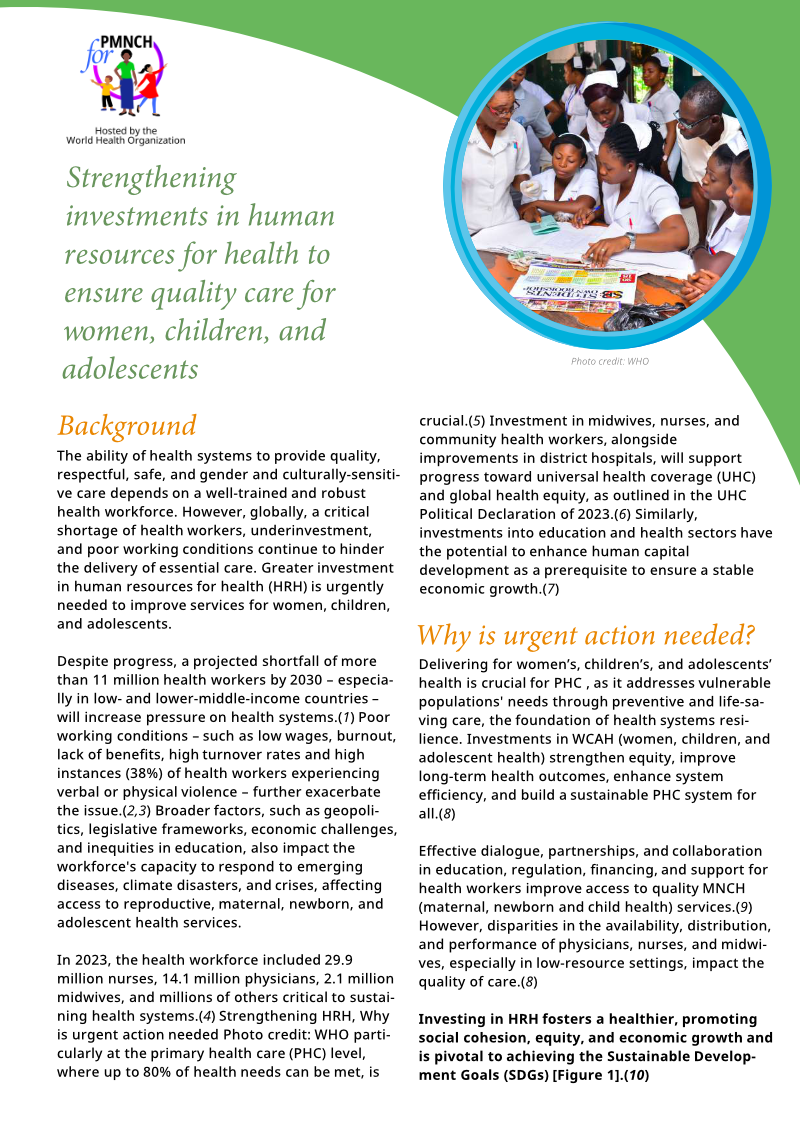Cape Town, South Africa - On the occasion of the FIGO World Congress XXV 2025, PMNCH led high-level dialogues and promoted evidence-based approaches to strengthen effective, respectful, and collaborative teamwork across health cadres and disciplines, with the goal of improving maternal and newborn health outcomes worldwide.
PMNCH co-hosted with UNFPA, FIGO, Jhpiego, and AlignMNH the Symposium entitled Working Together: Enhancing Interprofessional Collaboration for Optimal Maternal and Newborn Outcomes.
PMNCH convened on the occasion the leaders of major health-care professional associations (HCPAs), including FIGO, ICN, ICM, IPA, and COINN for a panel focusing on innovations, community and people-centred care, and strengthening partnerships to improve inter-professional collaboration, including in fragile and conflict-affected settings.
The discussions recognised that the health and well-being of mothers and babies depend on the seamless coordination of health cadres, including midwives, nurses, OBGYNs and paediatricians, and examined both the barriers and facilitators to effective inter-professional collaboration. Panellists address complex factors such as power dynamics, leadership, and social norms as root causes of fragmentation, and identified practical, tangible solutions to strengthen teamwork and shared decision-making across professions.
In her remarks, Dr Anne Kihara, President of FIGO, highlighted that, amidst fiscal constraints, inter-professional collaboration is essential to achieving greater synergies and upholding the quality of care for mothers and babies, particularly within the most vulnerable communities. She reflected on the importance of seamless team work to addressing critical country needs for sexual and reproductive health and rights (SRHR). "A culture of collaboration across health professions is at the heart of quality care. It transforms individual expertise into collective strength, ensuring that mothers and babies receive comprehensive, coordinated, and compassionate care,” she mentioned.
PMNCH also chaired a session exploring evidence-based tools and resources to better facilitate understanding and collaborative approaches to MNCH, including those developed by WHO, Jhpeigo and ICM.
Launch of landmark resource to strengthen human resources for health
The event also marked the launch of PMNCH’s latest advocacy brief: Strengthening investments in human resources for health to ensure quality care for women, children, and adolescents.
Co-branded by WHO, FIGO, COINN, ICM, ICN, IPA, and WONCA, this brief outlines the challenges currently facing the global health workforce and highlights key priorities for action, along with recommendations tailored to PMNCH constituencies. The guidance provided aims to strengthen and sustain investments in multi-disciplinary teams and to promote approaches that enhance inter-professional collaboration for high-quality maternal, newborn, and child health. Drawing on practical examples from Nigeria, Senegal, and Sierra Leone, the brief showcases innovative strategies and lessons learned from diverse contexts.
First ever World Postpartum Haemorrhage Day stresses urgent global action needed to save lives
Given that postpartum haemorrhage (PPH) – severe bleeding after childbirth – remains the leading cause of maternal mortality worldwide, the global community came together on 5 October 2025 to launch the first-ever World Postpartum Haemorrhage Day, calling for urgent and coordinated action.
To mark this historic day, the launch of the new Consolidated guidelines for the prevention, diagnosis and treatment of postpartum haemorrhage during the FIGO Congress was a significant step towards more effective implementation of evidence-based interventions, focused on equity and on reducing fragmentation to ensure that women receive the essential, lifesaving care they need.
In parallel, noting the need for coordinated advocacy around PPH, the PPH Roadmap Advocacy Working Group launched the Global Advocacy Framework for Postpartum Haemorrhage, focused on elevating the urgency of PPH, mobilising commitments and resources, and centring PPH action on equity, rights, and community voices.
A commentary from the PPH Roadmap Advocacy Working Group urged to use World PPH Day to commit and sustained visible action on the PPH Roadmap. The solutions are known—the collective duty now is to act decisively: set targets, strengthen systems, secure reliable supplies, and advance research until preventable postpartum haemorrhage deaths are eliminated.

.png?sfvrsn=6d0e27cd_1)




